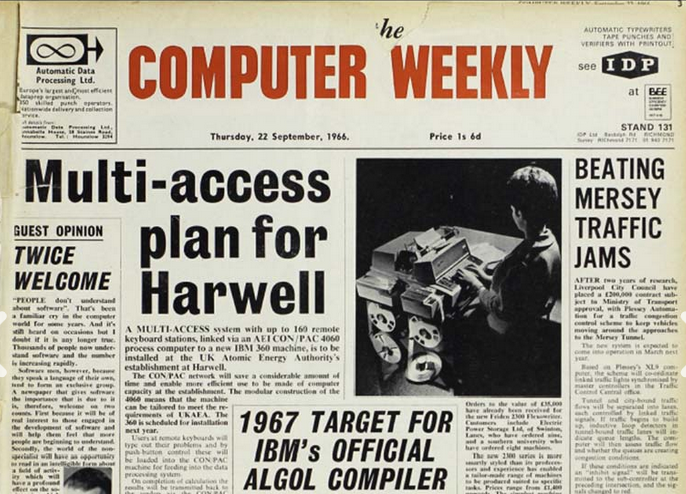
The world’s first weekly technology newspaper – Computer Weekly – today celebrates its 50th anniversary.
The London-based title has outlasted various online and print competitors and successfully navigated the switch from print to digital-only publication five years ago.
In 2011, it was sold off by Reed Business Information to Tech Target and and had a staff of ten. Today it has an editorial team of 18.
Editor since 2009, Bryan Glick, said a focus on quality journalism has been at the heart of his title’s survival.
He told Press Gazette: “There was a period in the late 2000s when the prevailing attitude was that you had to write as many stories per day as you can so that you’re going to be all over Google search.
“After I came here we went in completely the opposite direction, we said we are going to go back to basics and focus on depth and context and analysis and top quality contacts to get the stories up that other people don’t. And over time our audience has absolutely responded to that.
“We have found that when you are doing well informed high-quality content, lots of exclusives, very knowledgeable – our readers want to read more and more of that. That’s where our growth has come from.”
Today, he said that Computer Weekly derives less than 30 per cent of its income from display advertising. Instead, it asks readers to register in order to access premium content and the weekly magazine edition (which is still sent out via email as a PDF).
IT companies then pay Computer Weekly for information about the readers (and in particular which articles they are reading) in order to market technology products to them.
It is all a far cry from the 1990s when Computer Weekly made nearly all money from recruitment advertising – with more than 100 pages of ads per issue.

Glick (pictured above) said: “Getting to 50 years as a technology publication is something we’re enormously proud of.
“We were the world’s first weekly technology newspaper – spun out of a quarterly magazine at that time.
“We’ve seen a lot of other technology publications come and go. I came into technology journaism in 2000 – at the Dotcom peak – everyone assumed traditional brands like Computer Weekly were on their way out, everyone was going to these fantastic new websites. And here we are still 16 years later on from that when a lot of those whizzy great websites have disappeared.
“It’s been a huge challenge. We’re writing every week about how technology is changing business sectors and changing the way we work and we’ve been in the middle of the sector undergoing arguably the biggest technology-induced change of any other.”
After the loss of recruitment advertising to online in the early 2000s, Computer Weekly focused on selling display advertising. Despite a rapidly growing web audience, it soon became clear, says Glick, that this was not going to be the answer.
Explaining the current business model, he said: “We gather the demographic informaton about our readers, activity data about what they are doing and combine that information. It’s hugely valuable to technology companies trying to market to that audience.
“We are basically a data analytics business. We package up and sell data to technology vendors to help them in their marketing and to help them identify potential leads in what they are trying to do.”
Glick said that high quality journalism is at the heart of the business model because it is this which persaudes readers to register for premium content and the weekly edition. Reader behaviour on the PDF version (below) is also tracked and gathered.

Today, Computer Weekly magazine has a distribution of 200,000 a week (compared with 80,000 when it last appeared in print in 2011). This rises to up to 400,000 when monthly and quarterly regional editions for the Nordic countries, Benelux, South East Asia, Middle East and Australia/New Zealand are taken into account.
The website attracts around 1m visitors per month.
Computer Weekly is marking its anniversary with a special edition today looking back at the title’s 50-year history.
Listen to a longer version of this interview in Press Gazette’s Journalism Matters podcast:
Email pged@pressgazette.co.uk to point out mistakes, provide story tips or send in a letter for publication on our "Letters Page" blog
